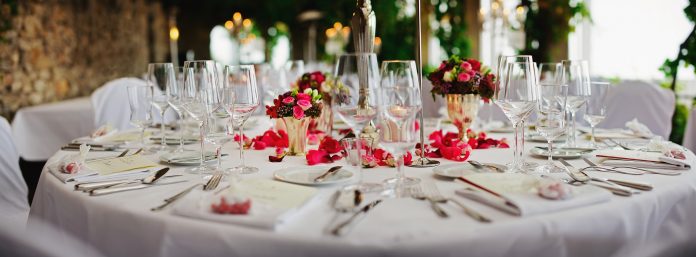How To Interview A Caterer
Here are a Number of Great Tips and Some Sample Questions to Ask Your Prospective Caterer. Also available is a printable “How to Interview Caterer Worksheet” (Available in Word and PDF Version)
Many people discover that their catered event is the biggest expense of their wedding or party. The cost of your wedding reception or party includes the food, beverages, kitchen staff, waitstaff, rentals, the decorations, and the cost of the reception site itself. About 50% of a couple’s wedding costs are the reception. It is very important to know how to interview and to choose a caterer.
SITE/AVAILABILITY
When you are selecting a facility such as a winery, hotel, country club, park, resort, reception hall, or restaurant you need to know whether the site includes the caterer. Some reception/facility sites have their own in-house caterer and they do not allow outside caterers to provide the food on their site. The site that your choose should match the formality of the event, the theme of your wedding/event, the type of food that you want to provide, and your budget. You may want to reserve a site where you have the freedom to choose your own caterer.
Is your event/wedding reception indoors or outdoors?
This is important to know what facilities are available at your site. Some facilities do not have sinks, kitchens, ovens, stoves, or barbecues for the caterers to work out of. In terms of the weather and the menu, the food may need to be kept hot or cold.
Pick a date! Once you have figured out if you need to hire an off-premise caterer, then you need to find out if they are available on the day of your event or wedding. The caterer you want could already be booked for an event on the same day of your affair.
You should try to book your caterer at least 6-12 months in advance of your event.
BUDGET
Now you need to decide if they can work within your budget!
- What is your budget for your catered event? Most caterers require an initial deposit to hold the date of your event.
- Is there a deposit required?
- What is the initial deposit and when is it due?
- Are installments or payment plans available?
- When is the final payment due for the catering?
- Is there a gratuity or service charge?
- How much are the taxes?
- How many hours of service does the caterer include in their overall cost?
- How much extra will it be if my event runs overtime?
- What does the caterer include in the price (e.g., set-up, clean up, staff, food, rentals, etc.)?
EXPERIENCE
- How long has the caterer been in business? Ask them about their experience, background, and culinary education.
- Have they catered weddings or your type of event previously?
- Have they handled the amount of guests that you have invited?
- Can they handle small or large events?
- What is the number of guests of the largest event that they have managed?
LICENSE/LIABILITY/HEALTH
- Are they licensed?
- Are they insured?
- Do they have health permits?
ALCOHOL
- Do they have a liquor license to purchase alcohol? If no, are they willing to serve your alcohol?
- Does your caterer provide bartender(s) to serve your beverages? How much extra is this service?
- Is there a corkage fee for serving my own wine?
- Is champagne service included for my wedding toast?
- Are the beverages served at the bar, buffet style, and do the waitstaff refill drinks at the tables?
Ice; don’t forget that you may need ice for the keg, bar, carafes of water. A good rule of thumb is ½ of pound of ice per guest. You may need extra ice in really hot weather.
RENTALS/EQUIPMENT
- What rentals are needed for your event?
- Is the rental equipment provided through the catering company or through a rental company?
There are many details to consider such as tables, and chairs, plates, napkins, table linens, chaffers, glassware, sternos, silverware, serving pieces, tents, etc. Some people choose to use plastic flatware and paper plates in order to save money.
Rental costs add up quickly if you rent extra silverware such as salad and dessert forks, bread/butter knives, dessert spoons, along with the basic table setting of forks, knives, and spoons.
There are many different grades of silverware, tableware, glassware, etc, and different colors of linens to choose from. You need to make some choices and find out the price differences for your rentals.
Your caterer can help you figure out what items that you need to rent.
Request to see samples of equipment to make sure it is what you want, that’s it’s not old, chipped, or in poor condition.
Most caterers charge you for rental equipment. Some caterers include the cost of rentals along with their food prices per guest.
HEAD COUNT
Prices are usually based on the number of guests that you plan to invite to your wedding or event. The caterer will need an initial head count or a rough idea of the amount of your guests.
- When does the caterer need to know the final head count? When you send out your invitations, keep in mind that the most caterers want a final count 1-2 weeks before your event.
- Does the head count include other wedding/party vendors, such as the DJ, Band, Wedding Consultant, and Photographer?
- Is there a price difference for the children and the wedding/party professionals?
- Is there some place else for the vendors to eat, out of site from your guests?
MENUS
- Do they have set menus or can they customize menus according to the theme or style of your event?
- Can they provide special menus such as vegetarian cuisine, kosher cuisine, or are they able to accommodate guests with food allergies?
SERVICE
- What methods do you want your food/beverages served?
- Are the hors d’oeuvres passed around to the guests by the wait staff or are the hors d’oeuvres stationary (sitting on a table)?
- What style do you want your main meal served? Ask your caterer about different styles of service that they provide. Specify what services are included and what details that they do not handle. Types to consider are buffet, seated or sit-down, French, Russian, and family styles.
Serving Styles:
- Seated or standard sit-down service is when the food is plated and portioned in the kitchen and the guest is served the plate of food while sitting down at the table.
- Russian Style is where the food is plattered and the server portions and serves each guest a portion of the entrée, starch, and vegetable, served with a fork and spoon.
- French Style is when the food is plattered tableside. The platters are presented to the guests and the guests pass and serve themselves. This requires more space and service can be slow.
- Family Style is when the food is in bowls and on platters in the middle of the table and the quests help themselves.
- Buffet Style is when the people stand in a food line.
- Does your caterer provide servers or is the buffet self serve?
- Does the catering include wedding cake service or do you have to hire someone to cut and serve the cake?
- Dress code for the waitstaff. Is it formal or casual? The attire should reflect the formality/theme of your event. The staff may wear tuxedo shirts with bow ties and blank pants or skirts. Butler style is when the waitpersons where white gloves. If you are having a Hawaiian theme party, ask your caterer to have the waitstaff where Hawaiian shirts.
RATIO
What is the staff to guest ratio? Generally, there should be at least one server per 30 guests for a buffet and one server per 20 guests for a sit-down dinner. However, it depends on how formal or complicated the event is. The ratio may be reduced, depending on these factors. A lavish six-course, sit-down dinner may require one server per 10-12 guests. Discuss the staff to guest ratio with your caterer.
FOOD
- Does the caterer use fresh ingredients/produce or does he/she use canned or frozen ingredients?
- Who are their food/produce suppliers?
- Do they bake their own breads/desserts or do they contract out to bakeries/chefs?
Generally speaking, the price of food includes all of the ingredients, preparation, and transportation of the food to your site.
Discuss portion sizes and the amount of food that needs to be prepared.
CONTACT/REFUNDS/CANCELLATIONS
Request a contract or proposal.
- What are the general terms of the contract?
- What is their cancellation policy?
- Is your deposit refundable if your wedding/event is cancelled?
Read all of the fine print including their cancellation policy, price per person, service charges, and taxes. After you read the contract make sure all parties that are involved sign it. Be ready to put down an initial deposit.
The contract should include:
- The date, time, location of the event, and hours of service provided by the caterer.
- The date that you need to provide the final head count.
- The list of services provided (e.g. buffet, sit-down meal, bar service, wedding cake service, etc.)
- The menu that you have selected.
- The fees, including an extra expenses, a payment schedule, and when the final balance is due.
- The name of the caterer handling the event.
- Finally, your contract should include the caterer’s cancellation policy.
CUSTOMER SERVICE
Talk to your caterer on the phone. Request the menus ahead of time. Then, schedule an appointment and meet with your prospective caterer in person.
- How does your caterer deal with you?
- Do you feel comfortable with your caterer?
- Does your caterer communicate with you effectively and is he/she helpful?
Your caterer should be available by appointment and by phone to answer any questions that you may have.
TASTING
Will your caterer provide an initial tasting/consultation? Some caterers will ask you to come in for a free tasting. Others will charge a fee. Some caterers will ask you to come into their restaurant if you want to try the food. However, some caterers do not provide tastings at all. They will give you references and show you pictures of their presentations of food. Be aware that preparing a meal for a few people and a few hundred is very different in the quantity, holding, and the transportation of the food.
Judging the food at the caterer’s kitchen is not always a true example of the food that is served at an event.
If you do go in for a tasting, ask your caterer is the tasting for free or does he/she charge a fee for the sampling?
How many people can I bring to the tasting? Don’t assume that you can bring 5 or 6 people to a tasting. Tastings are expensive and complicated to provide for the caterer. Ask if you can bring someone along, such as the bride or groom.
Request to look at pictures of events that they have done in the past.
REFERENCES
Request references from your caterer. Ask your friends, family, or colleagues for recommendations of caterers that they have employed for their events.
Some caterers will provide you with letters of references or phone numbers of clients that are willing to share their past experience with your caterer.
Ask the client questions about the quality of the food, if they were satisfied with the waitstaff/service, and ask about the overall presentation of the event.
LEFTOVERS
What is your caterer’s leftover policy? Do not assume that all of the leftovers are automatically yours. Most caterers make extra food for unexpected guests and to feed their staff. You are paying per person, much like a restaurant. However, some brides/grooms/hosts do not have time to eat during their reception/event. Therefore, some caterers will provide a leftover basket of their food. The couple can have a romantic picnic for two on their honeymoon and enjoy themselves when all of the commotion is over with.












